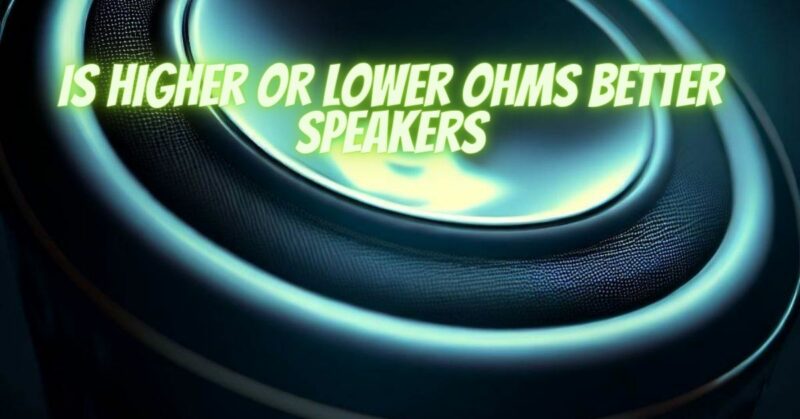Speaker impedance is the measure of how much electrical resistance a speaker has. It is measured in ohms, and most speakers are rated at 4, 6, or 8 ohms.
What does impedance mean for speakers?
Impedance affects how much power is required to drive the speakers. Speakers with higher impedance require more power to produce the same level of sound as speakers with lower impedance.
So, does higher impedance mean better speakers?
Not necessarily. The impedance of speakers is just one factor that affects sound quality. Other factors include the sensitivity of the speakers, the quality of the drivers, and the design of the speakers.
In general, speakers with higher impedance are more efficient. This means that they can convert more of the amplifier’s power into sound output. However, they can also be more demanding on the amplifier. This is because they draw more current from the amplifier.
Speakers with lower impedance are less efficient. This means that they will require more power from the amplifier to produce the same level of sound. However, they are less demanding on the amplifier.
So, which is better?
It depends on your needs and preferences. If you are looking for speakers that are efficient and produce a lot of sound, then speakers with higher impedance are a good choice. If you are looking for speakers that are easy to drive and do not require a lot of power, then speakers with lower impedance are a good choice.
Here are some things to consider when choosing speakers:
- What will you be using the speakers for? If you will be using them for casual listening, then speakers with lower impedance are a good choice. If you will be using them for critical listening or recording, then speakers with higher impedance may be a better option.
- What is your budget? Speakers with higher impedance tend to be more expensive than speakers with lower impedance.
- What other factors are important to you? Consider factors such as size, weight, and design when making your decision.
Ultimately, the best way to decide which impedance is right for you is to try out different speakers and see what sounds best to you.
Here are some additional things to keep in mind about speaker impedance:
- The impedance of speakers should be matched to the impedance of the amplifier. If the impedance of the speakers is too low, it can damage the amplifier. If the impedance of the speakers is too high, it can reduce the sound output.
- The impedance of speakers can vary depending on the frequency. This is called impedance mismatch. Impedance mismatch can cause distortion and reduce the sound output.
- It is important to consider the sensitivity of the speakers when choosing an amplifier. The sensitivity of the speakers is a measure of how much sound output they produce from a given amount of power. Speakers with higher sensitivity require less power to produce the same level of sound as speakers with lower sensitivity.
I hope this article helps you to understand the difference between higher and lower ohms speakers and how to choose the right impedance for your needs.


